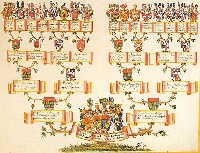
Answer all your family history questions with resources and research
Sometimes those skeletons in the closet start rattling too loudly to be ignored, and the whispers about long-lost relatives and their hushed-up scandals, or perhaps good deeds never acknowledged, demand your attentions.
When curiosity gets the better of you, it is time to start casting a glance back to your ancestors and crafting your family tree. Here are a few family history questions that might be answered with a little genealogical research.
Where Do I Start?
To trace back to the roots of your family tree, start with yourself and work backwards.
Write down as much information as you can remember, then start collecting the stories of older family members. Ask to make copies of photos, postcards, Bibles, diaries, and letters. Many families made notes of births and deaths inside their family Bible, and additional notations were often made on the back of photographs. These little bits of information may provide useful information as to relatives’ names, places of residence, and dates of important events.
Once you have several names to work with, make sure to check census and marriage and death records. Each bit of information can branch out into additional leads in your search for your ancestry.
~
Are We Descendants from Royalty?
Perhaps you are the great-great-grand-nephew of Friedrich Wilhelm, Duke of Schleswig-Holstein-Sonderburg-Glcksburg–or maybe you are third cousin once removed of Justin Bieber.
While you can’t choose your relatives, you can brag about them (or lament them, as the case may be) once you discovery what is lurking in your family tree. Many family famous trees are also available online, so grab your pedigree chart and start shaking the tree!
Where Did Our Ancestors “Come From?”
Names, dates, and other information contained in birth, death, and census records may help lead you to cities and states where your ancestors resided when they first immigrated to the United States. Many ships manifests are also available to view online which can help provide additional information. In addition, the Ellis Island records are available online and provide a treasure trove of information about those who passed through this “Gateway to America.”
Pay special attention to ancestral names and possible changes in spelling of names, or the Anglicization of names upon entering the United States, in order to find additional leads.
North or South?
The Civil War divided families and it was not uncommon for members of the same family to fight on different sides of the War.
To start your research, you will need the soldier’s name and, if possible, the state from which the soldier served. If you suspect that the soldier fought for the Union or Confederacy, you can use that information as a starting point as well. Then, to confirm a soldier’s state of service, you can contact the state archives in the state of possible service. (Some states have archival information available online, but some states may require a written request form be completed.)
Begin researching the muster rolls for the soldier’s suspected state of service. Once you confirm the state of service, you can then begin searching the pension records for that state.
Pension records contain a plethora of information regarding the soldier’s military career. If pension records do not exist for your ancestor (Union or Confederate), you can contact the National Archives and request the military record of the soldier in question.
By working your way through the available resources, you should be able to determine on which side(s) your ancestral soldiers fought and additional information about his service.
Be forewarned, though: researching your family history can be addicting. It starts with one simple family history question, then another, then another. Before you know it, you can spent hours online studying ship manifests, muster rolls, eighty years’ worth of census records, and the marriage records of thirteen states.
